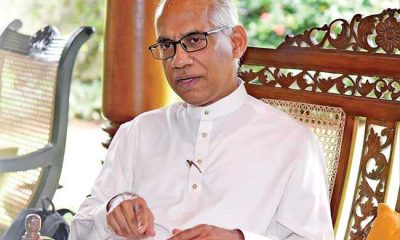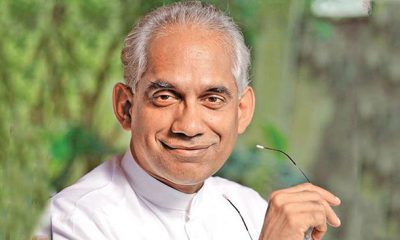Business
Eran outlines practical solutions aimed at resolving corruption and other issues
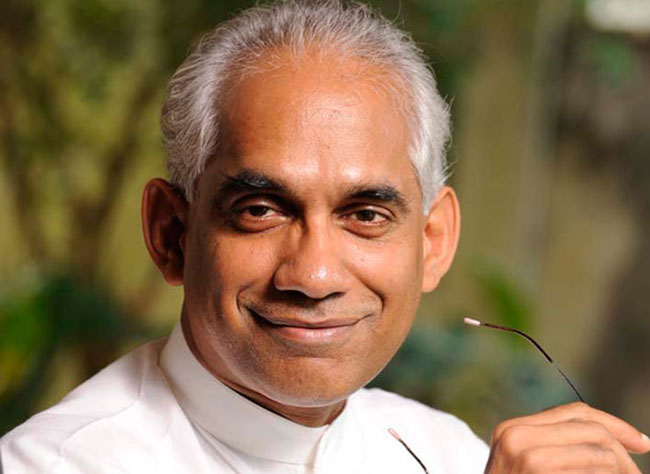
Continued From Yesterday
A National Land Bank
Another huge barrier you face when you are in business is, basically getting some land to set up a factory, industry or even an office. I am a person who came from your side (private sector) to this side (public sector) and I can share my view on this area of activity of obtaining land for a Multi model Transport Hub. I had to get involved with the UDA, CGR, CTB, Municipal Council, the state authorities; just to get a plot of land sorted out and it took nearly two years.
The President the other day said a National Land Council will be set up and a national land policy will be adopted. What I ask is, do it quickly rather than allow time to pass. We are taking it beyond that and we will create a National Land Bank. This is one of the huge obstacles, the businesses in our country face. That is why we want to make sure that we go in this direction.
Fuel and Energy issues
The other issue you are currently facing is fuel and energy. No easy solution and payment cannot be made as there is an immediate dollar shortage in the country. A few months ago MP Harshana Rajakaruna and I were at the COP – 27 meeting in Egypt where the President was in attendance at the meeting of leaders of countries meeting on energy and the environment. We were there as Members of Parliament with other Members of Parliament of South Asian countries. One of the things we don’t openly talk about is, we have a huge potential in sustainable energy; our policy is to open a system. Sri Lanka’s biggest hurdle is that we have closed our borders and we need to open them. Bigger issue is we have closed our minds and we have to open our minds and think out of the box.
Therefore, this potential can’t be tapped unless we have foreign investments and we heard our political parties saying that foreign investment will not be welcomed in the energy sector. What kind of nonsense is that? We are never going to do it with our savings because we know about our debt problem. Therefore, we have to open it up for foreign investment. I can’t understand their logic; what are we talking about here is solar energy and wind energy. We are selling the resources. Therefore we have to open up. We have so much of potential. Harshana and I had discussions with India, Nepal, Bangladesh and Bhutan. Sri Lanka’s needs can be met by more than that, we could even become an exporter of energy. Therefore we need to move in that direction.
Legal process
Other issues businesses have are legal issues. I must confess upfront I am not a lawyer, not a legal person. But there is a lot that has been written. Fair and equal treatment is absolutely important. Businesses also need guarantees against appropriations. When I was in Parliament first in 2010 – 2015, it was awful to see what the then government did.
The private sector lost confidence. We have constitutional guarantees. But despite the constitutional guarantees unlawful expropriation is a predominant concern of the private sector. State has the right to regulate, but not to unlawfully or indirectly expropriate. Fair treatment must be ensured and we will work on it.
We need to be seen as a reliable country where local and the foreign businesses actually can deal with us. This needs a lot of consultations on how we are going to do this. We need to make Sri Lanka a Centre for Arbitration in the region to move in this direction.
Centralised approvals for local BOIs
Why only the concept for foreign investments, why haven’t we thought about it? Several years ago when I was a banker I was asked how to develop ICT. I was not an ICT man but I was a developer. I was ask to take over the ICT. I went and looked at it. There were more drivers and clerks than ICT people there. I came up with a recommendation to shut it down and that is how the ICTA was started. Some of these reorganizations will have to be radical. I will give an indication that we will do the reforms; starting a new BOI for local businesses. We have to be radical in our thinking if we want to enable this country to go ahead. These are not new but other countries have done these things. Therefore, these things can be done.
Foreign Direct Investment (FDI)
Our foreign policy is that of an independent state. I like the old language that was used by Madam Sirimavo Bandaranaike. A Non – Aligned country. Taking into consideration the security concerns of our neighbour India, the closed proximity we have, we have to work intelligently. But we are an independent state. That is our foreign policy. In this foreign policy we don’t care where the investment comes from. Rule of Law will be paramount. We have to have an empowered BOI. Exports will be given primacy. Value addition to high- end services, basically high tech manufacturing institutions, will be relooked at.
SOEs
Harsha De Silva M.P gave the staggering statistics of State Owned Enterprises. I remember a former Prime Minister called me one day and said he wants to put Sri Lankan Airlines under me. I said Sir, wait a minute. I don’t want it. He looked very puzzled. He asked why? I said; Sir, there is no point in giving me the things that cannot be overturned by me. Everybody looked shocked. We have to stop fooling ourselves.
SoEs need to be reformed. I am going to tell you what our policies are. Our philosophy is limited government ownership in strategic areas. There are strategic areas, such as, finance, food and energy. But you know to do things better. I don’t think the government needs to be involved. You are the entrepreneur, you know the market you know better, therefore, you should be doing things. Now the number of SOEs have risen from 105 to 250.And the losses have risen to more than a trillion rupees. We believe in Public -Private Partnerships. We looked at various models of PPP.
We see now the institutions are put under different ministries and the ministers are managing them through their secretaries, like chief executives giving instructions to commercial enterprises. We want to move away from that. We want to take the people who know what to do to be in-charge of them. That is why that structure is important and the businesses can lead those structures. One more thing, bankruptcy can also be avoided. Therefore, we need a law on bankruptcy and on reorganizing bankruptcy. Preliminary work was done and the AGs Dept. played a key role in it.
Diaspora
We need to take this country to the next level. It is not going to be easy. I think we have a 2- 3 year struggle on our hands. Stabilization first, as Dr. Harsha said. If I use the word diaspora here, this word has been redefined with Sri Lanka’s conflict in mind. That is why I purposely use the words Overseas Sri Lankans. Sri Lankans living overseas are not a liability; they are one of the biggest assets this country has. Their educational level is very high, they have the technology and the foreign currency, so many huge advantages and we want to welcome them here. If they decide to have dual citizenship they will be given it. Their 2nd generation born abroad will be given permanent residence and we will open our doors to them and their investment. Why should we close the door on these biggest assets we have?
Education for all
Physical location is a great advantage this country has. We are the hub of the Indian sub-continent in education and human resources. Airport, ports, logistics are available.
SJB policy is that every child in this country must have access to higher education.
Though education is a public good the supplier need not necessarily be the government. Private sector too can be a supplier.
Two private sector medical colleges opened by the private sector previously were shut down due to protests by left wing political parties who are against private sector contributions towards education.
The responsibility of the government is regulation in providing education.
We want to preserve our societies and families. We don’t want our youngsters going abroad, looking for greener pastures or for shelter in other countries. This not only about the economy but also about values culture, family society etc.
Business
HNB Assurance Recognized with Merit Award at the Great HR Awards 2025

HNB Assurance PLC was recognized at the Great HR Awards 2025, receiving the Merit Award in the Finance, Insurance, Real Estate, and Investment sector. This recognition reflects the company’s continued commitment to strengthening its people strategy, nurturing a progressive culture, leveraging technology and maintaining strong industrial relations.
Sharing his thoughts on this accomplishment, Lasitha Wimalarathne, Executive Director / Chief Executive Officer of HNB Assurance PLC, stated, “This recognition reiterates our belief that people are the true drivers of our success. Over the years, we have invested significantly in building an environment where our teams feel inspired and supported to deliver their best. As we continue to grow as one of Sri Lanka’s best insurance companies, this award reflects our ongoing efforts to build a workplace where both our people and our business can thrive. My sincere thanks go out to our HR team for continuously driving these initiatives.”
Commenting on the award, Navin Rupasinghe, Head of HR / DGM at HNB Assurance PLC, said, “Our people-first philosophy shapes every HR initiative we design, from strengthening learning pathways and leadership development to enhancing employee well-being and engagement. This recognition validates our ongoing efforts to build a workplace culture grounded in trust, inclusivity and performance. As we look ahead, we remain committed to evolving our HR practices to meet the expectations of our people and the future of work. My sincere thanks to the CIPM for this recignition.”
Business
MullenLowe Sri Lanka named Creative Agency of the Year in South Asia
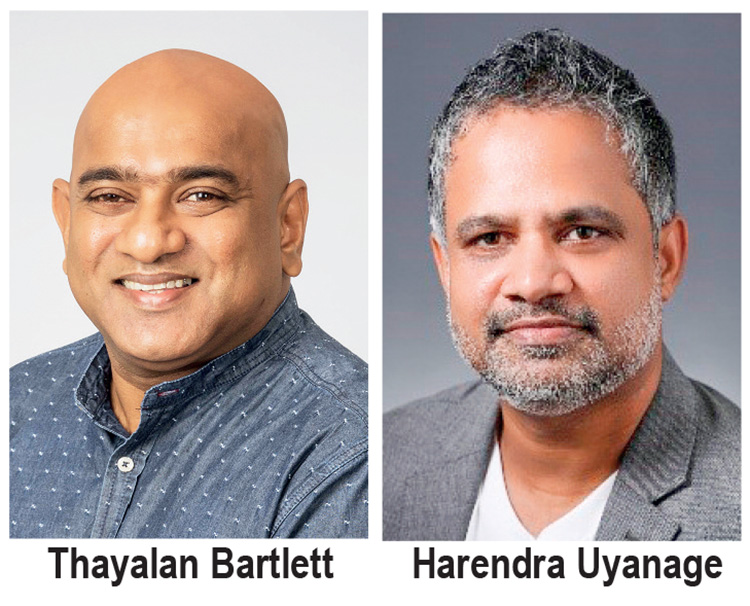
MullenLowe Sri Lanka has been awarded Gold as the Rest of South Asia’s Creative Agency of the Year at the Campaign Agency of the Year Awards 2025, held recently at Mumbai’s ITC Maratha Hotel. The accolade marks a landmark year for the agency, driven by breakthrough ideas, ambitious brands, and a surge in economic activity.

Campaign Agency of the Year – South Asia 2025 (Rest of South Asia – Creative Agency) awarded to MullenLowe Sri Lanka
Guided by a clear creative vision and extensive category expertise across 111 brands in 33 sectors, MullenLowe strengthened its position through strategic leadership appointments, talent acquisition, and the integration of AI-enabled tools. These initiatives created an environment where creativity, learning, and commercial impact worked in tandem, supporting long-standing client relationships and consistent new business momentum.
Thayalan Bartlett, Executive Chairman, said, “Our growth is rooted in a people-first, creative-centred culture. By attracting top talent and focusing on continuous upskilling, we have enriched both our creative and strategic capabilities.”
The agency’s innovation was further enhanced by Fever, its AI-enabled production studio, and LoweGo, a subscription-based design unit, enabling faster and more scalable solutions for modern marketers. Training programs, including an international AI workshop in Baku for top creative minds, helped unify teams around technology-driven creativity, leading to MullenLowe’s highest Effie points haul in a decade.
Harendra Uyanage, Senior Vice President and Executive Creative Director, added, “This recognition celebrates a team that constantly stretches its creative boundaries, transforming every brief into opportunity.”
The win adds to a series of recent accolades, including Most Effective Agency of the Year at the 2024 Effie Awards, and multiple awards at Dragons of Sri Lanka and SLIM Digis 2025, cementing MullenLowe’s vision to become Sri Lanka’s most commercially impactful creative company by 2030.
Business
ComBank named Sri Lanka’s Best Trade Finance Bank at Euromoney Awards 2025

The Commercial Bank of Ceylon PLC was named Sri Lanka’s Best Trade Finance Bank at the prestigious Euromoney Transaction Banking Awards 2025, in recognition of the Bank’s strong performance and continued contribution to supporting Sri Lanka’s export and import sectors.
This global recognition from Euromoney, a leading authority in financial markets, celebrates institutions that demonstrate innovation, leadership, and measurable impact in transaction banking across cash management, payments, trade finance, and technology. Commercial Bank is Sri Lanka’s clear market leader in trade finance, commanding a 21% share in exports and a 14.26% share in imports, demonstrating its strong presence across both segments.
In 2024, the Bank supported over US$ 5 billion in trade transactions, underscoring its unmatched role in enabling the flow of goods, services, and foreign exchange. Its leadership has also been recognised regionally by the Asian Development Bank (ADB), which named Commercial Bank its Leading Partner Bank in Sri Lanka for the fourth consecutive year under the Trade and Supply Chain Finance Programme.
At the forefront of Commercial Bank’s recent innovations is ComBank TradeLink, Sri Lanka’s first fully integrated, end-to-end digital trade finance platform. The system brings all trade finance operations – from Letters of Credit to export collections and shipping guarantees – into one secure online interface, providing customers real-time visibility, faster processing, and paperless convenience. This digitalisation drive has redefined the client experience, reduced manual processes and improved turnaround times across thousands of transactions.
The Bank’s commitment to advancing Sri Lanka’s trade sector extends beyond technology. Through initiatives such as the ComBank Trade Club, which facilitates connections between buyers and suppliers both locally and internationally, and ComBank LEAP | GlobalLinker, a digital business networking platform for SMEs, the Bank is actively building bridges between Sri Lankan entrepreneurs and global markets. Its Diribala Exporter Development Programme further empowers micro, small, and medium enterprises to become export-ready, providing access to expert guidance, training, and financial support.
Reflecting on the award, Commercial Bank said the recognition from Euromoney was a tribute to the trust placed in the Bank by Sri Lanka’s exporters and importers, and to the dedication of its trade finance teams who continue to innovate and deliver excellence in a rapidly evolving global landscape.
As Sri Lanka’s largest private sector bank and the first to surpass US$ 1 billion in market capitalisation, Commercial Bank continues to lead in supporting national trade, driving digital transformation, and shaping a more inclusive and resilient export economy, the Bank said.
Commercial Bank was the first bank in the country to be listed among the Top 1000 Banks of the World, and has the highest Tier I capital base among all Sri Lankan banks. The Bank is the largest private sector lender in Sri Lanka and the largest lender to the country’s SME sector. Commercial Bank is also a leader in digital innovation and is Sri Lanka’s first 100% carbon-neutral bank.
Commercial Bank operates a network of strategically located branches and automated machines island-wide, and has the widest international footprint among Sri Lankan banks, with 20 branches in Bangladesh, a fully-fledged Tier I Bank with a majority stake in the Maldives, a microfinance company in Myanmar, and a representative office in the Dubai International Financial Centre (DIFC). The Bank’s fully owned subsidiaries, CBC Finance Ltd. and Commercial Insurance Brokers (Pvt) Limited, also deliver a range of financial services via their own branch networks.
-

 Features5 days ago
Features5 days agoFinally, Mahinda Yapa sets the record straight
-

 News7 days ago
News7 days agoOver 35,000 drug offenders nabbed in 36 days
-

 News6 days ago
News6 days agoCyclone Ditwah leaves Sri Lanka’s biodiversity in ruins: Top scientist warns of unseen ecological disaster
-

 News7 days ago
News7 days agoRising water level in Malwathu Oya triggers alert in Thanthirimale
-

 Features5 days ago
Features5 days agoHandunnetti and Colonial Shackles of English in Sri Lanka
-

 Business3 days ago
Business3 days agoCabinet approves establishment of two 50 MW wind power stations in Mullikulum, Mannar region
-

 Business7 days ago
Business7 days agoSri Lanka betting its tourism future on cold, hard numbers
-
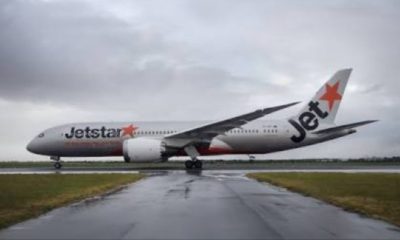
 News7 days ago
News7 days agoJetstar to launch Australia’s only low-cost direct flights to Sri Lanka, with fares from just $315^




